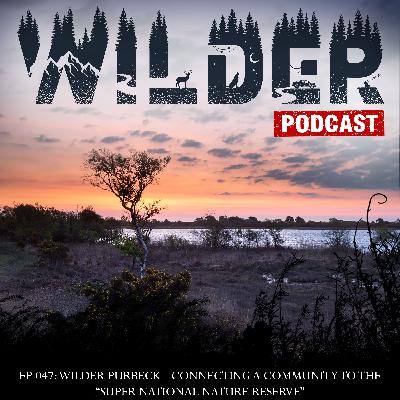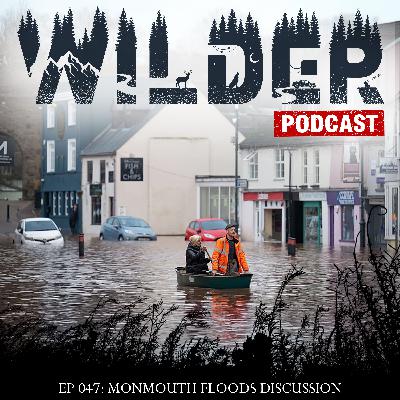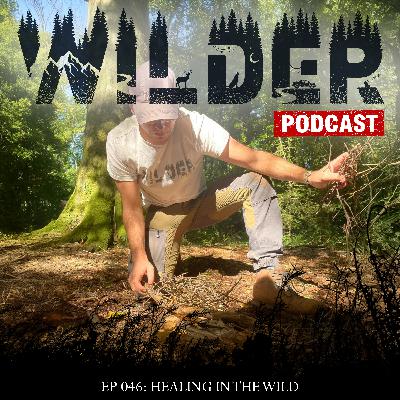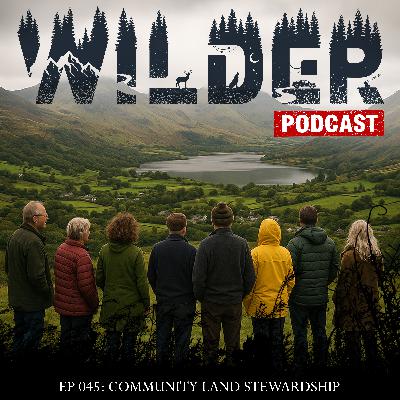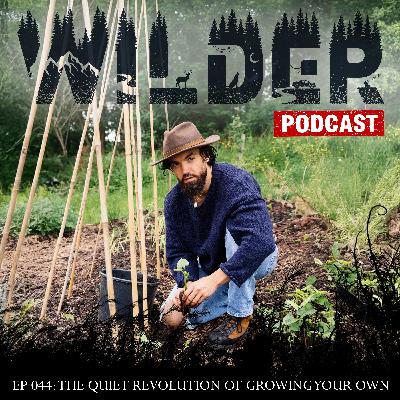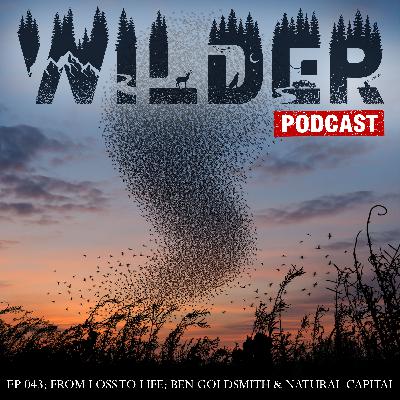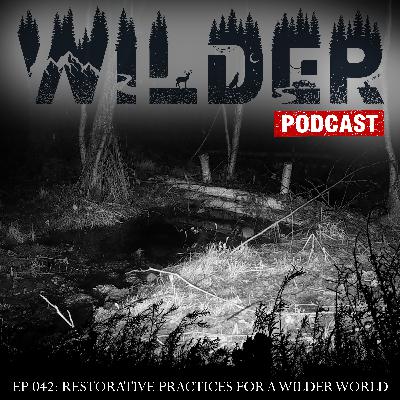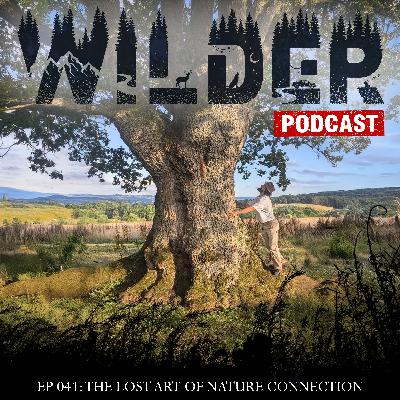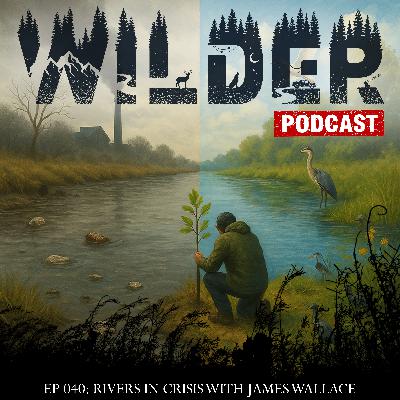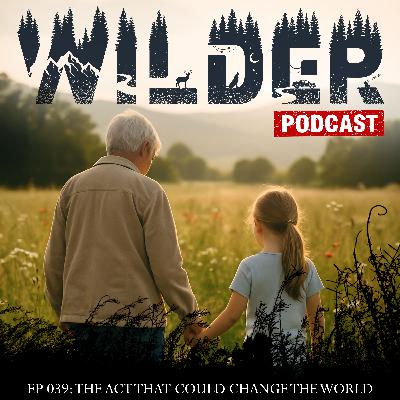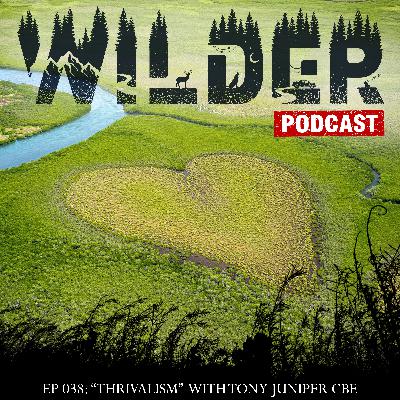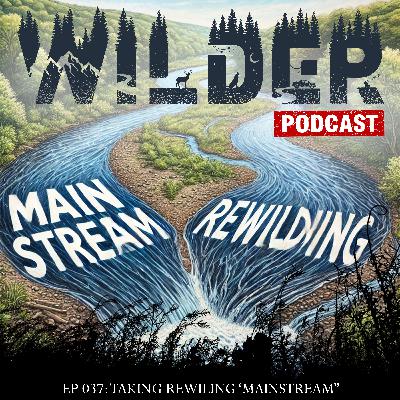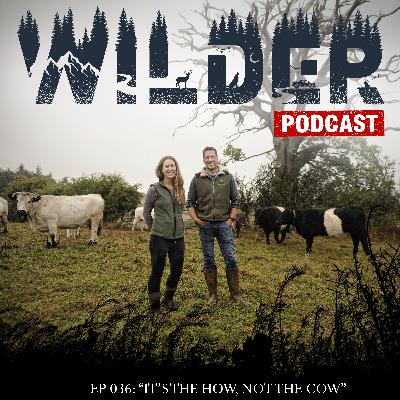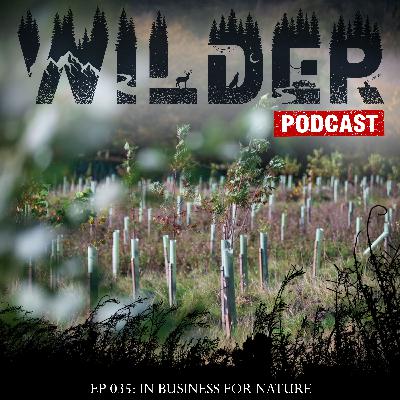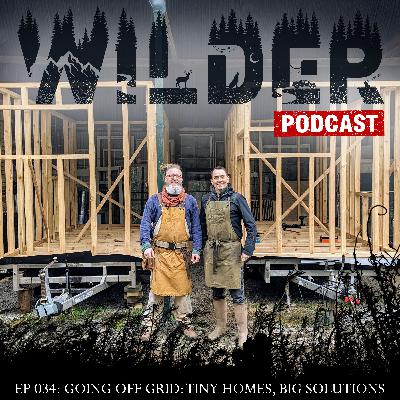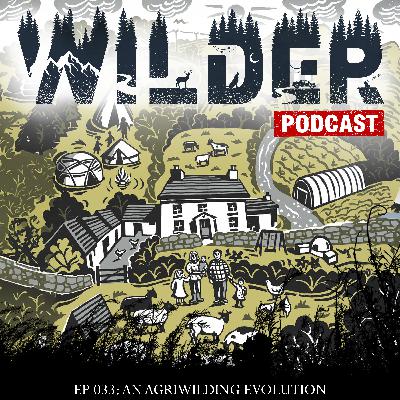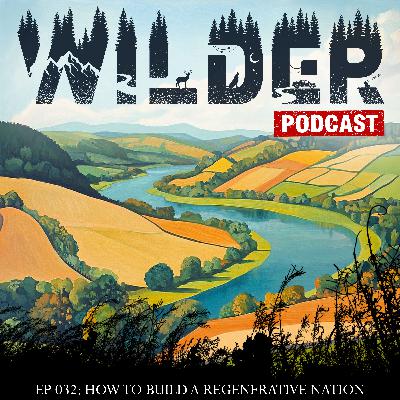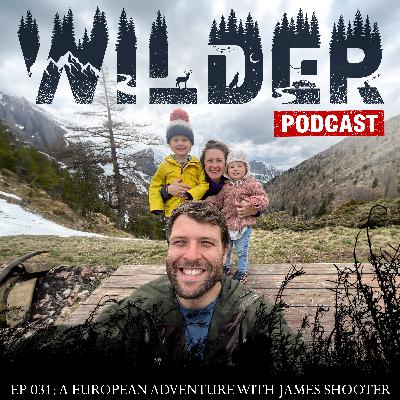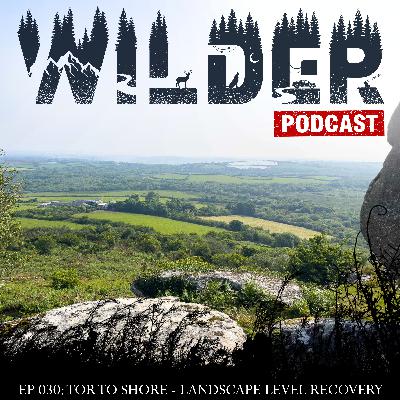Discover Wilder Podcast
Wilder Podcast

Wilder Podcast
Author: Grange Project
Subscribed: 31Played: 586Subscribe
Share
© Copyright 2026 Grange Project
Description
Welcome to the Wilder Podcast! Co-hosted by Chloe and Tom, we explore topics including "rewilding", sustainable living and climate change, whilst documenting our attempts to apply these principles on our 80 acres in rural Monmouthshire.
We speak with experts who are passionate about understanding, protecting and restoring the natural world, to the benefit of us all. Whether that’s a professor of rewilding, a micro green start-up or charity founders, we explore their stories in a way that’s accessible to all.
Alongside their expertise, we also share our journey of the Grange Project - where we are learning through doing and without any relevant background in ecology or nature recovery. Essentially, we ask the stupid questions so you don’t have to.
Whether you're a seasoned environmentalist, a nature enthusiast, or simply curious about how you can make a difference, we hope this podcast will entertain, inspire (and perhaps educate a little too)!
We speak with experts who are passionate about understanding, protecting and restoring the natural world, to the benefit of us all. Whether that’s a professor of rewilding, a micro green start-up or charity founders, we explore their stories in a way that’s accessible to all.
Alongside their expertise, we also share our journey of the Grange Project - where we are learning through doing and without any relevant background in ecology or nature recovery. Essentially, we ask the stupid questions so you don’t have to.
Whether you're a seasoned environmentalist, a nature enthusiast, or simply curious about how you can make a difference, we hope this podcast will entertain, inspire (and perhaps educate a little too)!
50 Episodes
Reverse
Tom and Chloe sit down with Clare from Planton farm to explore what regenerative agriculture really means. Drawing on Claire’s journey from the conventional food industry into regenerative farming, the conversation explores why our current food system is under strain and how working with nature offers a viable, hopeful alternative.Together they explore soil health, livestock grazing, culture change in farming, and the realities farmers face when trying to shift away from extractive systems. From cattle as “ecosystem engineers” to the surprising role chickens can play in regeneration, this episode is a grounded, honest look at food, farming and the mindset shifts required to restore landscapes while keeping farms viable.Key topics & chapter markers[00:00] – Introduction and contextClare joins the podcast after visiting the Grange Project, sharing her background and passion for grazing livestock and regenerative farming.[03:56] – What regenerative agriculture actually meansA clear explanation of regeneration as the opposite of degradation – restoring soil, water, biodiversity and people – and why there is no single “recipe” for doing it well.[05:24] – Regenerative vs organic farmingHow organic and regenerative systems overlap, where they differ, and why organic certification doesn’t automatically guarantee soil regeneration.[07:05] – The challenge of definition and greenwashingWhy regenerative agriculture lacks certification, how the term can be misused, and the importance of asking one key question as a consumer: what is this regenerating?[08:48] – Why the current food system is strugglingA look back to post-war agriculture, the drive for volume, the rise of chemical inputs and the unintended consequences for soil health, nutrition, biodiversity and resilience.[13:16] – Economics of regenerative farmingWhy high-input, high-output farming is hitting a ceiling, how rising input costs are eroding margins, and why some farmers turn to regenerative approaches for financial survival as much as environmental reasons.[15:02] – Culture change and farmer mindsetFarming as identity, pride and tradition – and why regenerative farming challenges deeply held ideas about tidiness, productivity and what “good farming” looks like.[20:28] – Roots to RegenerationClare explains the two-year Roots to Regeneration programme, designed to support farmers and food-system professionals through deep, supported transition rather than surface-level change.[24:23] – Cattle, climate and eating less but better meatWhy grazing animals can be central to regeneration, how grasslands co-evolved with ruminants, and why cattle can act as ecosystem engineers when managed well.[29:38] – Chickens in a regenerative systemExploring pasture poultry, nutrient imbalance, river pollution and why the current chicken industry is structurally broken.[36:07] – Interconnected roles on the farmHow chickens and cattle support each other through manure management, pest control, fertilisation and orchard grazing.[38:47] – The future of farmingRegenerative agriculture as a potential fifth agricultural revolution, the rise of eco-literacy and a vision of farming that is more resilient, humane and joyful.About the guestClare is a regenerative farmer and food-system specialist based in Shropshire. She runs Planton Fam, an 80-acre regenerative holding integrating cattle, chickens, trees and perennial crops. With a background spanning the...
In this pre‑Christmas episode, hosts Chloe and Tom sit down with Tom Clark and Alex Brocklesby from the National Trust at Purbeck.Purbeck is one of the UK’s most biodiverse areas, yet many residents remain disconnected from the nature on their doorstep. Tom and Alex explain how varied geology; including Pool Harbour, chalk ridges and heathlands, creates an incredible range of habitats.They describe how the Purbeck Heaths, the UK’s first super national nature reserve, unites 3500hectares of heathland owned by NGOs, statutory bodies and private landowners. The conversation explores why connecting local communities to this landscape is as important as ecological restoration, highlighting systemic barriers like work pressures and lack of time.Key topics & chapter markers:Each bullet below begins with the approximate start time for that segment:[00:05] Welcome & purpose of the Wilder Podcast. Chloe and Tom explain that the podcast has evolved from documenting their family’s rewilding journey to exploring wider systemic challenges—education, community, economy and eco‑entrepreneurship.[04:20] Conservation sheep and lessons in rewilding. Chloe and Tom recount borrowing six conservation sheep, difficulties moving them between fields and why most commercial sheep aren’t suited to rewilding. Conservation breeds like the Castlemilk Moorit nibble less and promote diverse grasslands.[16:55] Introducing Purbeck’s biodiversity. Tom Clark and Alex Brocklesby describe Purbeck as one of the most biodiverse parts of the UK because of its varied geology—harbours, chalk ridges, heathlands and limestone cliffs. They note the long‑standing presence of organisations like Natural England, the National Trust and RSPB.[19:17] Super National Nature Reserve. The guests explain that the Purbeck Heaths are the UK’s first super national nature reserve. The reserve unites several smaller reserves into a continuous 3500 hectare landscape that includes private landowners, demonstrating collaboration beyond NGOs.[20:54] – Experiences on the Isle of Purbeck. Visitors can see snakes, lizards, puffins, eagles, beavers and butterflies; picnic in flower‑rich meadows; explore sheltered beaches with seahorses; wander ancient woodlands; watch sunsets; or go coasteering along the Jurassic Coast. Four million people visit each year because the region offers so many ways to connect with nature.[22:55] – Why local people aren’t more connected to nature. Despite living in a biodiverse landscape, Purbeck residents aren’t any more nature‑connected than people elsewhere. Nearly 40 % of local children start school without ever having been to the beach. Tom and Alex discuss building trust with schools, community groups and businesses and reflect on the need for community‑led approaches, rather than top‑down conservation.[27:19] – Systemic barriers & opportunities. Modern lifestyles—commuting, low‑paid seasonal work, high numbers of second homes—leave little time for nature connection. Society is structured around nine‑to‑five routines rather than natural rhythms. The guests urge listeners to co‑create solutions that make time in nature accessible to everyone.About the guests:Tom Clark Land & Outdoors Manager for the National Trust’s Purbeck portfolio. He leads teams responsible for nature conservation, habitat restoration and visitor engagement across the Purbeck Heaths. Tom is passionate about collaborative, community‑led rewilding and believes the future of conservation depends on partnerships between NGOs and local people.Alex Brocklesby Community & Volunteering Manager for the National Trust at Purbeck. With a background in...
Guest: Tom Johnstone – Founder of We Are Nature BasedHost: Tom Constable (co‑founder of The Grange Project)Episode overviewIn this special episode, Tom Constable talks to flood‑management expert Tom Johnstone about the catastrophic flooding that recently hit Monmouthshire and large parts of Wales. We explore what drove the event, whether it was simply a natural flood or part of a climate‑induced trend, and what practical solutions exist to reduce future risk. This conversation is grounded in both data and lived experience; it also responds to a social‑media debate where some posts dismissed any link between climate change and flooding.About Tom Johnson:Founder of We Are Nature Based, a community interest company that helps water companies, local authorities and land managers adopt natural flood management techniques.Works across the UK integrating nature‑based solutions with traditional (grey) infrastructure, including leaky woody dams, tree planting and wetland creation.Previously collaborated with the Grange Project to install around 50 leaky woody structures in their stream – an effort that Tom Constable credits with slowing water on the farm.Episode highlights:[00:00] Introduction & purpose – Host Tom Constable explains the devastating floods that struck Monmouthshire and his aim to explore whether the floods are climate‑induced or natural.[01:50] Acknowledging the impact – Guest Tom Johnson sends sympathies to affected communities, noting the hardship and setting the tone for a thoughtful discussion.[03:20] Why Tom Johnstone? – Tom Johnstone outlines his credentials as the founder of We Are Nature Based and his expertise in natural flood management.[04:30] What happened? Rainfall & river levels – The conversation turns to the flood statistics: nearly 120 mm of rain fell in 12 hours (more than 10 % of the annual average) and the River Monnow’s defences were overtopped.[06:30] Are floods climate‑induced? – Tom Johnson explains that while floods are natural, the frequency of heavy rainfall and droughts is increasing due to climate change.[09:00] Land use, soils & runoff – They discuss how centuries of land drainage, river straightening and intensive farming have compacted soils and accelerated runoff; Tom uses a dried‑out sponge analogy to describe baked soils repelling water.[13:00] Dredging vs. slowing the flow – A pragmatic discussion on dredging where it’s needed and why slowing the flow with leaky dams, ponds and vegetation is often a better approach.[16:00] Grange Project anecdote & climate projections – Tom Constable shares how hedgerows, tussocky grass and woody debris have slowed runoff on his farm; Tom Johnson discusses predictions of more flash‑flood events in Wales.[19:00] Beyond higher walls: budgets & catchments – They question the wisdom of endlessly raising flood walls and advocate investing some flood‑defence budgets in catchment‑wide natural solutions.[22:00] Policy & planning recommendations – Tom Johnstone suggests permeable paving for new developments, smart rainwater butts, incentives for farmers to hold water on their land, and...
In episode 46 of The Wilder Podcast, hosts Chloe and Tom explore how wild places heal people and ecosystems. Their guest is Jo Roberts, CEO of the Wilderness Foundation UK. Jo shares how her childhood in South Africa fostered a deep respect for wilderness, how trauma influenced her career path, and why she believes access to nature should be a basic public health right. The conversation covers the Grange Project’s latest updates (volunteers, community‑days and new Berkshire pigs), the difference between parks and true wilderness, and the Wilderness Foundation’s programmes for survivors of domestic abuse, young people experiencing mental‑health challenges and at‑risk youth. Together they discuss why being outdoors with others, facing manageable challenges and reconnecting with non‑human nature can transform mental and emotional health.Guest:Jo Roberts – CEO, Wilderness Foundation UKJo has been Chief Executive of the Wilderness Foundation since 2004 and previously worked as Projects Director and Project Coordinatorwildernessfoundation.org.uk. A South African by birth, Jo was shaped by wild places across Africa and studied social anthropology during apartheid. She moved to the UK in 1984 and later merged her global network of wilderness practitioners into programmes that use nature to promote wellbeing and behavioural changewildernessfoundation.org.uk. Jo is a master NLP practitioner and psychotherapeutic counsellor who leads wilderness therapy programmes, with research interests in how immersion in nature affects mental healthwildernessfoundation.org.uk. She also serves on the Essex Climate Action Commission and champions the idea that “we help nature and nature helps us”wildernessfoundation.org.uk.Timestamps & Topics:[00:00] Introductions & Grange Project update[08:00] Jo Roberts’ background[16:00] What counts as wilderness?[28:00] Why wilderness heals[36:00] Programmes & therapeutic work[45:00] Access to nature as a public health right[55:00] Reflections & takeaways:Key Takeaways:Wild places are medicine. Research on the Wilderness Foundation’s TurnAround programme shows that spending time in wilderness and receiving long‑term support improves emotional wellbeing for most participants and helps them into education, training or worksmileymovement.org.Nature‑based therapy blends challenge and care. Programmes like Blossom and Brave Futures combine bushcraft, outdoor cooking and art therapy with trauma‑informed counselling
This week on the Wilder Podcast, we sit down with Chris Blake to explore how communities can steward land through collaboration, long-term vision and trust between local people and public bodies. We also share Grange Project updates (bumper apple harvest, the market garden & "cathedral-scale" polytunnel!), two recent courses, and announce Wilder Away Days - our nature-based corporate retreats.Key takeaways:Community land stewardship ≠ one model. Freehold, long leasehold, management agreements and co-production each offer different ways for local values to shape land.Co-production works when power is shared. Start with a blank page, bring evidence-givers (forestry, ecology, education), and let a mixed panel turn evidence into values & principles - not expert-written plans.Continuous Cover Forestry (CCF) can beat clear-fell on 100-year horizons: better soils, flood risk, vistas - and local, steady jobs from ongoing thinning rather than boom-and-bust harvesting.Public bodies win too. Communities unlock grants, volunteers and entrepreneurial energy that agencies often lack - delivering outcomes already in policy (biodiversity, access, carbon).Trust is the glue. A year-long, facilitated process built mutual respect between Natural Resources Wales managers and residents; FSC certification also helps keep plans on track.Practical first steps. If transfer isn’t feasible, explore long leases or co-produced forest/resource plans; talk to national support orgs early (see "Resources").Timestamps:00:06 — Welcome & what’s ahead00:30 — Grange Project update: community day, record apple harvest & juice pressing06:50 — Announcement: Wilder Away Days (purposeful team retreats in wild nature)10:15 — Guest intro: Chris Blake & the journey to community stewardship13:05 — What is “community land stewardship”? Why it matters15:40 — Lessons from Scotland’s community buyouts (Noidart, forestry, hydro, housing)19:40 — The co-production model in the Rhondda: who’s in the room & how it ran27:55 — Designing for Continuous Cover Forestry & local jobs over decades30:00 — Why agencies benefit: capacity, risk culture, and policy delivery34:35 — Accountability: FSC, public scrutiny & relationship-based safeguards37:55 — Inside the room: creative methods, expert “witnesses,” values > wish-lists47:50 — Where to go for help (nation-specific orgs)49:47 — Closing reflections: changing the values that shape landscapes50:02 — Hosts’ debrief: win-wins, optimism, and where else co-production fitsGuest:Chris Blake - social entrepreneur focused on community energy and land stewardship; founding director at The Green Valleys,...
In this episode, Tom and Chloe sit down with chef-turned-homesteader Gaz Oakley to explore his remarkable journey from the high-pressure kitchens of Cardiff and London to a more grounded life growing food and foraging in the Welsh hills. With 1.8 million YouTube followers, five cookbooks, and a deepening connection to land, Gaz shares how food, nature, and simplicity became the foundation of his transformation.This honest conversation explores the systemic challenges of modern living, the healing power of growing your own food, and how small acts like growing herbs on a windowsill can become a radical form of resistance.Key TakeawaysNature deficiency is real. Gaz describes the anxiety and disconnection he felt in city life — and how growing his own food and spending time outdoors radically improved his wellbeing.Food is medicine. From fermenting tomatoes to foraging yarrow, Gaz has reimagined food not just as fuel but as nourishment for body, soul, and soil.Start small, grow meaningfully. Whether it's a tomato plant on a windowsill or an allotment plot in the city, Gaz encourages listeners to take accessible first steps towards food autonomy.Authenticity over aesthetics. Despite his large digital following, Gaz speaks candidly about the tension between online influence and offline peace, and his longing to connect with people in-person through real-world projects.Music, clothing, and relationships change. When you reconnect with nature, everything else aligns — even your Spotify playlist.Timestamps00:00 – A sip of hibiscus and a warm welcome01:00 – Setting the tone: hospitality, herbs, and grounding rituals03:00 – What’s The Grange Project? An intro for new listeners06:00 – Upcoming community day highlights (apple pressing, polytunnel building, wood meadows)08:00 – Meet Gaz Oakley: chef, YouTuber, homesteader11:30 – From burnout to foraging: Gaz’s turning point during COVID15:00 – How growing food changed Gaz’s entire relationship with cooking18:00 – The deeper meaning of foraging, soil health, and nourishment22:00 – From beats to birdsong: how Gaz’s music taste reflects his transformation25:00 – Systemic critique and compassion for city dwellers28:00 – Social media, influence, and the silent revolution of self-sufficiency34:00 – How self-sufficient is Gaz? The ups and downs of growing most of your food38:00 – Time, joy, and the rhythm of gardening41:00 – Herbalism, slow living, and detoxing from industrial life46:00 – Gaz’s advice: practical steps for rewilding your life — even in the city50:00 – Final reflections and future plans52:00 – Postscript chat: bromances, polytunnels, and McDonald’s metaphorsGuest BioGaz Oakley is a chef, author, YouTuber, and passionate homesteader based in Wales. Best known for his plant-based recipes and hugely popular channel "Avant Garde Vegan", Gaz is now on a mission to grow his own food, live more naturally, and inspire others to reconnect with the land.Links & ResourcesGaz Oakley on YouTube: https://www.youtube.com/avantgardeveganThe Grange Project: https://www.grangeproject.co.ukJoin the WhatsApp Community: https://www.grangeproject.co.uk/whatsappNewsletter Signup: Stay updatedSupport the podcast: Rate, review, and share!Mentioned in this episode:Visit & Stay at the Grange ProjectWould you like to escape the trappings of the modern world and wake-up in the morning to one of the best views in South Wales, where only the birds are noisy? We have two beautiful and sustainably built ‘tiny homes’, carefully located in secluded locations across our 80 acre rewilding project.Visit Grange Project
In this episode of the Wilder Podcast, we sit down with Ben Goldsmith, financier, conservationist, and passionate rewilding advocate, to explore the deeply personal and global dimensions of nature restoration.Ben shares how the tragic loss of his daughter, Iris, became the catalyst for rewilding his Somerset farm, transforming grief into a living love letter to her wild spirit. We also explore his belief in the healing power of nature, both for individuals and for landscapes, and why reconnecting young people with the natural world is one of the greatest challenges of our time.From there, we broaden the lens to global rewilding projects and the emerging role of nature credits, from carbon and biodiversity credits to water quality markets, in funding large-scale ecological recovery. Ben explains the opportunities, risks, and integrity challenges of these markets, and why, despite their imperfections, they may be one of the most powerful tools available to scale restoration at speed.Key TakeawaysHow the loss of Ben’s daughter Iris inspired his family’s rewilding journey.The healing role of nature in times of deep grief.Why rewilding can happen on any scale, from a window box to thousands of acres.The promise and pitfalls of nature credits, from carbon markets to biodiversity net gain.Why reconnecting young people with nature is essential for our collective future.How hope, optimism, and pragmatic financing can fuel a wilder world.Timestamps00:00 – Weather, drought, and the Grange Project’s changing landscape09:30 – Introducing Ben Goldsmith and his lifelong passion for nature16:00 – Rewilding in memory of Iris: grief, love, and transformation27:00 – Nature connection, childhood, and ecological identity33:00 – The return of beavers and winning hearts for rewilding36:00 – Nature credits explained: carbon, water, biodiversity46:00 – Risks, integrity, and scepticism in new nature markets52:00 – The future of Welsh farming and policy courage01:00:00 – Reflections on accountability, funding gaps, and next stepsGuest Bio – Ben GoldsmithBen Goldsmith is an environmentalist, investor, and writer. He chairs the Conservative Environment Network and is the founder of Rewilding the World, a podcast sharing stories of global restoration. His memoir, God is an Octopus, documents his journey through grief and the solace he found in rewilding his Somerset farm after the tragic loss of his daughter Iris. Ben has also worked extensively in green investment, particularly in natural capital and renewable energy, seeking ways to channel finance into large-scale ecological recovery.HostsTom & Chloe Constable are the founders of the Grange Project, an 80-acre rewilding initiative in Monmouthshire, Wales. Through the Wilder Podcast, they document their journey in restoring nature, raising a young family, and exploring the wider rewilding movement with leading voices from around the world.The Wilder PodcastThe Wilder Podcast explores the people, ideas, and projects driving the rewilding movement. From family farms to global landscapes, we share honest conversations about restoring nature, finding hope, and building a wilder future.Connect with Us🌱 Visit the Grange Project: www.grangeproject.co.uk🌿 Follow on Instagram:
In this episode of the Wilder Podcast, Chloe and Tom discuss the recent opening of the Grange Hub and explore two significant restorative practices: Natural Flood Management (NFM) and Nature Guardianship. Tom Johnston from We Are Nature Based CIC explains how NFM utilises natural processes to manage water flow, contrasting it with traditional gray infrastructure. The conversation also explores Nature Guardianship, a concept that integrates the voice of nature into decision-making processes. The episode highlights the need for a mindset shift in water management and the potential for these practices to create our 'wilder world'.Community discount for the Grange Project's Wilder Cabins: 'COMMUNITY10'. Click here.Your Hosts:Tom Constable: https://www.linkedin.com/in/tom-constable/Chloe Constable: https://www.linkedin.com/in/chloe-constable-24155821b/Website: https://www.grangeproject.co.ukPodcast Journey Page: https://www.grangeproject.co.uk/wilder-podcastGrange Project Contact & Social Media:Email: hello@grangeproject.co.ukInstagram: https://www.instagram.com/grange.project/Facebook: https://www.facebook.com/groups/grangeprojectYouTube: https://www.youtube.com/@GrangeProjectLinkedIn: https://www.linkedin.com/in/tom-constable/Takeaways:The Grange Hub opening marks a significant milestone for the project.Natural Flood Management (NFM) uses natural processes to manage water flow.NFM can prevent flooding and enhance biodiversity.Nature Guardianship brings the voice of nature into decision-making.Restorative practices reconnect humans with nature.Community engagement is crucial for successful environmental initiatives.Cumulative small interventions can have a large impact on water management.Mindset shifts are necessary for effective water management.Nature Guardianship can help shift cultural attitudes towards nature.Investing in nature-based solutions is essential for sustainability.Chapters:00:00 Introduction to the Wilder Podcast and Grange Hub Opening12:23 Natural Flood Management: Understanding the Concept42:07 Nature Guardianship: A New Approach to Decision-Making54:25 Restorative Practices: Reflections from the interview.
SummaryIn this episode of The Wilder Podcast, hosts Chloe and Tom explore the concept of nature connection, discussing its importance for mental health and wellbeing, the barriers that prevent it, and the pathways to rekindling our relationship with the natural world. They explore the significance of understanding nature connection, particularly among adolescents, and stress the need for systemic change to encourage deeper engagement with nature. The conversation underscores the reciprocal relationship between people and the environment, calling for a shift in language and policy to strengthen nature connection across society.Prof Miles Richardson's booksWebsiteThe Blackbird's SongReconnectionNature Connection Research GroupTakeawaysNature connection is vital for mental health and wellbeing.The UK ranks low in both nature connectedness and biodiversity.Urbanisation and technology are major contributors to disconnection from nature.Emotional engagement and education can foster stronger nature connection.Adolescents often experience a notable dip in nature connection during their teenage years.Research shows a strong correlation between nature connection and pro-environmental behaviour.Engaging the senses is a powerful way to deepen nature connection.Community involvement plays a key role in successful nature restoration projects.Nature connection should be seen as a reciprocal relationship.Systemic changes are essential to improving access to nature for everyone.Chapters00:00 – Introduction10:49 – Understanding Nature Connection16:01 – Defining Nature Connection21:25 – Nature Connection and Wellbeing32:55 – Barriers to Nature Connection45:43 – Pathways to Nature Connection50:48 – Engaging Adolescents in Nature Connection55:54 – Reflections and Future Directions
What happens when we treat our rivers like sewers, ignore regulation, and allow polluters to profit from destruction? In this milestone 40th episode of The Wilder Podcast, we sit down with James Wallace, CEO of River Action, for one of our most eye-opening conversations yet. Beyond the outrage, this conversation is a masterclass in what needs to change, how it can change, and what each of us can do to be part of the solution.Your HostsTom Constable: https://www.linkedin.com/in/tom-constable/Chloe Constable: https://www.linkedin.com/in/chloe-constable-24155821b/Website: https://www.grangeproject.co.ukPodcast Journey Page: https://www.grangeproject.co.uk/wilder-podcastGrange Project Contact & Social MediaEmail: hello@grangeproject.co.ukInstagram: https://www.instagram.com/grange.project/Facebook: https://www.facebook.com/groups/grangeprojectYouTube: https://www.youtube.com/@GrangeProjectLinkedIn: https://www.linkedin.com/in/tom-constable/Fencing Company Tom Mentioned: https://www.wilcrickgroup.co.uk/Our Guest: James Wallace is the CEO of River Action, an environmental NGO committed to ending river pollution in the UK. A former archaeologist, campaigner, and founder of multiple environmental organisations, James has worked on conservation projects from the UK to Madagascar, and now leads legal and policy challenges to clean up Britain’s rivers.🔗 Visit River Action UK 🌊 Explore the River Rescue Kit 📱 Follow @riveractionuk on Facebook, Instagram, TikTok, LinkedIn and XEpisode Timestamps:[00:00] Introduction and updates from the Grange Project, including the new market garden, the first school visit to the project and freedom for the pigs.[09:42] Meet James Wallace – CEO of River Action and hear his journey from chalk stream childhood to river campaigner[13:42] What’s the problem with our rivers? A breakdown of pollutants[17:46] What healthy rivers could mean for wildlife, communities and the economy[23:24] Why haven’t we fixed this already? A deep dive into regulation and politics[27:35] What can individuals and communities do to make a difference?[34:33] What is the River Rescue Kit and how will it help local campaigners?[38:00] Do we need new laws or better enforcement of existing ones?[42:42] Political will, lobbying pressure, and the role of growth narratives[46:00] Why River Action is pursuing new legal challenges in 2025[49:00] Reflections on the river as a public good—and why this moment matters[53:20] Closing reflections from Tom & Chloe⭐️ Enjoyed the Episode?Tap Follow or Subscribe so you...
In this episode we speak with the inspirational Jane Davidson, the former government minister who proposed the groundbreaking Wellbeing of Future Generations Act. We discuss how the Act came to be, the influence the legislation has had and why Wales is now being watched by countries around the world looking to follow its lead.Your Hosts:Tom Constable: https://www.linkedin.com/in/tom-constable/Chloe Constable: https://www.linkedin.com/in/chloe-constable-24155821b/Website: https://www.grangeproject.co.ukPodcast Journey Page: https://www.grangeproject.co.uk/wilder-podcast**Community Day Sign-up** https://www.grangeproject.co.uk/volunteers-dayThrivalism Episode: https://www.grangeproject.co.uk/wilder-podcast/ep-038-thrivalism-with-tony-juniper-cbeGrange Project Contact & Social Media:Email: hello@grangeproject.co.ukInstagram: https://www.instagram.com/grange.project/Facebook: https://www.facebook.com/groups/grangeprojectYouTube: https://www.youtube.com/@GrangeProjectLinkedIn: https://www.linkedin.com/in/tom-constable/Our Guest: Jane Davidson is an environmentalist, author and international speaker. From 2000 - 2011, Jane was Minister for Education, then Minister for Environment and Sustainability in the Welsh Government, where she proposed legislation to make sustainability the central organising principle; the Wellbeing of Future Generations Act came into law in 2015. She introduced the first plastic bag charge in the UK, and her recycling regulations took Wales to third best in the world. She created a Climate Change Commission for Wales, the post of Sustainable Futures Commissioner, and the Wales Coast Path. Website: https://janedavidson.wales/LinkedIn: https://www.linkedin.com/in/jane-davidson-24070337/Listen out for:[00:00:00] Tom and Chloe update on the project, including an exciting update about the opening of the Grange Hub.[00:04:17] Jane introduces herself and the rich influences from her background.[00:13:23] We hear about the development of the Wellbeing of Future Generations Act, what it contains and what it means.[00:21:02] Chloe asks about how the act was received at a government level.[00:26:18] Tom questions Jane about examples of policy shifts associated with the act and she shares various examples, for example: universal basic income for care leavers,...
Tony Juniper, Chair of Natural England, shares with us a powerful thesis: we cannot fight the climate and ecological crisis without first addressing social inequality. Not content with just highlighting these connections, Tony describes the system change necessary to move us all forward; the new political philosophy of Thrivalism. Your HostsTom Constable: https://www.linkedin.com/in/tom-constable/Chloe Constable: https://www.linkedin.com/in/chloe-constable-24155821b/Website: https://www.grangeproject.co.ukPodcast Journey Page: https://www.grangeproject.co.uk/wilder-podcastGrange Project Contact & Social Media:Email: hello@grangeproject.co.ukInstagram: https://www.instagram.com/grange.project/Facebook: https://www.facebook.com/groups/grangeprojectYouTube: https://www.youtube.com/@GrangeProjectLinkedIn: https://www.linkedin.com/in/tom-constable/Our Guests: Tony’s career is devoted to Nature recovery, environmental protection and sustainable development. Working across many activities, including research, campaigning, policy and writing. Involvement with many organisations including Friends of the Earth, Wildlife Trusts, WWF, HRH The Prince of Wales’s International Sustainability Unit, CISL Cambridge and Birdlife International. In depth activity on climate change, Nature conservation, circular economy and more. Now the Chair at Natural England.Website: https://tonyjuniper.com/LinkedIn: https://www.linkedin.com/in/tony-juniper-cbe-a2763b31/?originalSubdomain=ukNew book "Just Earth": https://amzn.eu/d/8cwIaHnListen out for:[00:00:00] Tom provides a brief overview of the Grange Project and they discuss their latest addition: The Market Garden.[00:08:50] Tony introduces himself and his thesis that the environmental crisis cannot be addressed without first considering social inequality. [00:11:40] We discuss examples of the connection between these two concepts including the disproportionate use of resources, the perceived value of limitless economic growth and the differing impacts of environmental decline. [00:17:07] Tom asks about how the book has been received.[00:19:05] Chloe reflects on how cost of living is often given as a justification for environmental inaction, particularly with regards to cheap food, water and energy bills.[00:23:43] We talk about how we need to respond to these challenges and the concept of Thrivalism.[00:29:07] Chloe raises the point about how it’s in everyone’s interests to work towards a fairer society due to the risks of both environmental and...
In this joyful episode to celebrate World Rewilding Day, we take a big picture view as Alister addresses key questions such as ‘what does a rewilded world look like’, ‘how do we get there’ and ‘what are the benefits?’ Amongst a range of topics, we discuss climate stabilisation, eco distress and environmental education, as well as the power of success stories in bringing the necessary energy to ‘take rewilding mainstream’.Your Hosts:Tom Constable: https://www.linkedin.com/in/tom-constable/Chloe Constable: https://www.linkedin.com/in/chloe-constable-24155821b/Website: https://www.grangeproject.co.ukPodcast Journey Page: https://www.grangeproject.co.uk/wilder-podcastGrange Project Contact & Social Media:Email: hello@grangeproject.co.ukInstagram: https://www.instagram.com/grange.project/Facebook: https://www.facebook.com/groups/grangeprojectYouTube: https://www.youtube.com/@GrangeProjectLinkedIn: https://www.linkedin.com/in/tom-constable/Our Guests: Alister has been a lifelong environmentalist since the eradication by silage making of the Corncrake where he grew up in the north west of Ireland. The thread of Alister’s career has been to learn how to make big, positive change happen. With a doctorate from the Science Policy Research Unit, University of Sussex, Alister spent 15 years at the interface between science and policy. He has helped to build multiple movements and has supported many catalytic leaders as a trained coach and facilitator. A father of two and widower, Alister loves to get out in nature and the great outdoors. Alister is an Honorary Professor at University College London.Website: https://globalrewilding.earth/LinkedIn: https://www.linkedin.com/in/dralisterscott/?originalSubdomain=ukListen out for:[00:00:00] Chloe and Tom provide a brief overview of the Grange Project and introduce the episode.[00:03:20] Alister introduces himself and the global rewilding alliance.[00:11:32] We talk about the stages of the rewilding movement: invention, experimentation, preparing for global scaling, scaling and mainstreaming. [00:19:54] Alister describes what a rewilded world at scale would look like, including changes at an urban scale and to people’s everyday lives.[00:28:36] We question Alister about the connections between rewilding, climate stabilisation and eco distress.[00:35:01] We talk about the power of the concept of rewilding and Tom asks Alister about the steps required to achieve the vision of mainstream rewilding.[00:41:26] Tom questions Alister about one of the oft cited challenges facing rewilding at scale, that of food security.[00:47:19] Chloe asks Alister how we create effective stories outside of the environmental movement.[00:50:55] We discuss the role of education in the rewilding movement.[00:58:40] Tom and Chloe...
Join us round the farmhouse kitchen as we chat with Emily and Alex, the co-founders of Grazing Management. Over a cup of tea, and some excellent fruit cake, we discuss what conservation grazing is, why it’s so important for biodiversity and how they are managing to make it into a successful business. Your Hosts:Tom Constable: https://www.linkedin.com/in/tom-constable/Chloe Constable: https://www.linkedin.com/in/chloe-constable-24155821b/Website: https://www.grangeproject.co.ukPodcast Journey Page: https://www.grangeproject.co.uk/wilder-podcastGrange Project Contact & Social Media:Email: hello@grangeproject.co.ukInstagram: https://www.instagram.com/grange.project/Facebook: https://www.facebook.com/groups/grangeprojectYouTube: https://www.youtube.com/@GrangeProjectLinkedIn: https://www.linkedin.com/in/tom-constable/Our Guests: Grazing Management was set up by Alex and Emily Crawley in 2018. What started as an award-winning idea has since expanded into a business with an ever-growing flock and herd. They have built significant experience of working on a wide range of sites and still get excited about the emergence of wildflowers from areas which were once deserts of bracken. They were proud winners in their category at the prestigious British Farming Awards in 2023. Website: https://grazingmanagement.co.uk//LinkedIn: https://www.linkedin.com/in/alexander-crawley-78a3a014a/ & https://www.linkedin.com/in/emily-crawley-9361386a/Listen out for:[00:00:00] Chloe and Tom update on the Grange Project, including their reflections on the largest community day yet.[00:06:38] Emily and Alex introduce themselves, their backgrounds and the origins of Grazing Management. [00:15:00] We talk about the role of large herbivores in enhancing biodiversity.[00:22:01] Alex explains about the benefits of diversity for the cattle in kind, with the reduction in the use of medication.[00:24:46] Emily talks about the day to day operations of Grazing Management and the journey to this point. [00:29:44] We hear about the no fence collar and the possibilities this provides.[00:35:24] Alex describes the differing impacts of hay cutting and mob grazing versus conservation grazing.[00:40:37] Tom asks about the relationship of this system to methane and carbon.[00:44:27] We finish by discussing the varied income streams associated with Grazing Management.[00:46:34] Tom and Chloe reflect on the interview.Mentioned in this episode:Visit & Stay at the Grange ProjectWould you like to escape the trappings of the modern world and wake-up in the morning to one of the best views in South Wales, where only the birds are noisy? We have two beautiful and sustainably built ‘tiny homes’, carefully located in...
What does it take to turn a family passion into a powerful force for nature? In this episode of two halves, we start with an update about The Grange Project, including the last 6 months of physical interventions, our evolving business structure, and the latest developments at The Grange Distillery and Studio. We then move into conversation with Helen Neave, co-founder of Make it Wild, where we discuss their purpose of protecting nature across 500 acres in North Yorkshire, using carbon-offsetting and corporate partnerships to create a sustainable financial model.Your Hosts:Tom Constable: https://www.linkedin.com/in/tom-constable/Chloe Constable: https://www.linkedin.com/in/chloe-constable-24155821b/Helpful Links:Website: https://www.grangeproject.co.ukPodcast Journey Page: https://www.grangeproject.co.uk/wilder-podcastGrange Distillery: https://grangedistillery.com/Grange Project Contact & Social Media:Email: hello@grangeproject.co.ukInstagram: https://www.instagram.com/grange.project/Facebook: https://www.facebook.com/groups/grangeprojectYouTube: https://www.youtube.com/@GrangeProjectLinkedIn: https://www.linkedin.com/in/tom-constable/Our Guest: Helen Neave, Make it Wild:Helen is a retired surgeon on a mission to change the planet. Alongside her husband, Christopher Neave, they turned their family passion for nature into Make it Wild. With nature reserves across North Yorkshire, they have planted over 80,000 trees, dug ponds, restored wildflower hay meadows, protected ancient woodland and created many different habitats across over 500 acres. Working in partnerships with businesses, whether through carbon-offsetting, team conservation days or natural mindfulness walks, their purpose is to protect nature.Website: https://www.makeitwild.co.uk/LinkedIn: https://www.linkedin.com/in/helen-neave-42200938/Listen out for:[00:00:00] Chloe and Tom describe the structure of the episode, including a brief introduction to our guest, Helen from Make it Wild, and a brief summary of the landscape of the Grange Project.[00:04:06] Chloe leads an update in numbers about the physical interventions that have occurred across the project since September 2024; including trees, brash piles, yellow rattle, the tiny forest and our market garden. [00:10:35] Tom moves into a conversation about the structure of the Grange Project and the decision to move from a Community Interest Company into a Limited Company and Charity.[00:12:51] Finally, we update on the other commercial updates across the project: The Grange Distillery and the Grange Studio.[00:15:47] Helen introduces herself and the mission and landscape of Make it...
If you’ve ever contemplated heading to the hills in your own off-grid escape, this is the episode for you. Craftsman builder Simon Whitfield of the Tiny Home Company covers the key ingredients necessary to create your own self-built home, as well as philosophy underpinning the ‘tiny living’ lifestyle. We are so grateful to have worked with Simon in crafting the Grange Project’s Tiny Homes, if you feel inspired to experience them yourself after the episode, please book via our website.**Book to stay in one of our wonderful cabins by clicking here**Your Hosts:Tom Constable: https://www.linkedin.com/in/tom-constable/Chloe Constable: https://www.linkedin.com/in/chloe-constable-24155821b/Website: https://www.grangeproject.co.ukPodcast Journey Page: https://www.grangeproject.co.uk/wilder-podcastGrange Project Contact & Social Media:Email: hello@grangeproject.co.ukInstagram: https://www.instagram.com/grange.project/Facebook: https://www.facebook.com/groups/grangeprojectYouTube: https://www.youtube.com/@GrangeProjectLinkedIn: https://www.linkedin.com/in/tom-constable/Our Guest: Simon Whitfield, The Tiny Home CompanyThe Tiny Home Company was founded in 2013 by craftsman builder Simon Whitfield. With 20+ years of carpentry and building experience, the company has grown organically through years of practice converting and creating live-in vehicles, traditional cabins and tiny houses. Simon and his family have lived in self built homes on wheels ranging from their vintage double decker bus to ‘the chapel’ - a dream tiny home project which has now been lovingly converted into a luxury glamping wagon. Simon also teaches courses with Black Mountains College, covering an introduction to Tiny Home design and building.Website: https://www.tinyhomecompany.co.uk/Listen out for:[00:00:00] Chloe and Tom update on what’s occurred on the project since the last episode (including an apology and a big announcement!)[00:04:29] Simon describes his background and what exactly he means by a Tiny Home.[00:08:32] Tom invites Simon to give an overview of the process and key ingredients involved in building a Tiny Home.[00:16:11] We hear about where Simon sources his timber and the characteristics that he values.[00:22:32] We discuss the importance of insulation and energy sources, including a debate about the relative merits of natural versus reclaimed synthetic materials.[00:32:20] We talk about the values that inform conscious decision making and the courage that’s required to make these choices. [00:39:14] We hear about how Simon is contributing...
Matt Swarbrick, a farmer in North West Wales, shares with us the journey of Henbant. Using the principles of holistic decision making and agriwilding, they’ve created a thriving ecosystem that enables them to produce delicious nutrient dense food and magical spaces for both people and nature. Enjoy Matt’s warmth and passion as he paints a picture of the beautiful world they are creating. Your Hosts:Tom Constable: https://www.linkedin.com/in/tom-constable/Chloe Constable: https://www.linkedin.com/in/chloe-constable-24155821b/Website: https://www.grangeproject.co.ukPodcast Journey Page: https://www.grangeproject.co.uk/wilder-podcastGrange Project Contact & Social Media:Email: hello@grangeproject.co.ukInstagram: https://www.instagram.com/grange.project/Facebook: https://www.facebook.com/groups/grangeprojectYouTube: https://www.youtube.com/@GrangeProjectLinkedIn: https://www.linkedin.com/in/tom-constable/Our Guest: Matt Swarbrick, HenbantMatt Swarbrick is a permaculture inspired farmer at Henbant in North Wales. An ecologist and filmmaker by background he and his family and the Henbant team are on a mission to prove that with a small farm you can produce good food, financial profit, build soil and biodiversity, build a community and enjoy it all at the same time. Henbant has an 80 share CSA scheme and produces enough eggs, beef and veg for 80 local families from amongst a diversity of silvopasture systems. They are now working with the Wildlife trust to explore the space between ecologically intensive farming and maximum biodiversity enhancement; agri-wilding Henbant’s watershed. Henbant runs a range of courses in and is one of Europe’s leading models of small scale regenerative agroecology.LinkedIn: https://www.linkedin.com/in/matt-swarbrick-322503289/?originalSubdomain=ukWebsite: https://www.henbant.org/Listen out for:[00:00:00] Tom and Chloe update on the project, focused on food production focused developments.[00:06:48] Matt introduces himself and his background.[00:12:30] Matt describes their journey to Henbant and the layout of the farm. [00:17:25] We discuss their approach; holistic decision making and the concept of agriwilding.[00:24:33] Tom and Chloe question Matt about the food Henbant is producing including the importance of agroforestry.[00:30:11] We discuss risk, entrepreneurship and the value of diversification.[00:35:58] Chloe asks about how people are invited to join the system at Henbant.[00:39:16] Matt tells us about the courses that are run from Henbant.[00:43:42] We question Matt about the future vision for...
How do you make a nation regenerative? What does it take to transform the Wye and Usk catchments? Jyothi Banerjee and North Star Transition are asking some of the most complex questions of our time, with three clear objectives: to propose a plan which is transformative, locally owned and investable. This is a fascinating conversation about systems change from an incredibly articulate communicator. Your Hosts:Tom Constable: https://www.linkedin.com/in/tom-constable/Chloe Constable: https://www.linkedin.com/in/chloe-constable-24155821b/Grange Project Contact & Social Media:Email: hello@grangeproject.co.ukInstagram: https://www.instagram.com/grange.project/Facebook: https://www.facebook.com/groups/grangeprojectYouTube: https://www.youtube.com/@GrangeProjectLinkedIn: https://www.linkedin.com/in/tom-constable/Our Guest: Jyoti Banerjee, Co-Founder and CEO of North Star TransitionJyoti was part of the team that created the Integrated Reporting movement globally. He has been an impact investor for two decades and used to be an entrepreneur in the tech sector. He taught technology entrepreneurship at Said Business School, University of Oxford. He grew up in New Delhi and lives in London.LinkedIn: https://www.linkedin.com/in/jyoti-banerjee/?originalSubdomain=ukWebsite: https://www.northstartransition.org/Helpful Links:Website: https://www.grangeproject.co.ukPodcast Journey Page: https://www.grangeproject.co.uk/wilder-podcastCitizen Zoo Conference Details: https://www.citizenzoo.org/https://sites.google.com/citizenzoo.org/2025rewildingconferenceListen out for:[00:00:00] Tom and Chloe update on the project, including our new ‘podcast journeys’ (find them on the Grange Project podcast webpage), a new floor for the Wilder Hub and the Citizen Zoo Conference: Rewilding Our Future.[00:05:20] Jyoti introduces himself and the origin of North Star Transition.[00:10:55] We hear about the approach of North Star Transition and their ambition to make Wales a regenerative nation.[00:17:20] Jyoti sets the context for the Wye Usk Transition Lab by describing why this landscape is in crisis. [00:21:30] Tom asks why the landscape is still deteriorating despite over 20 years of understanding and Jyoti describes the risk of the ‘silver bullet’ and the importance of asking the right question.[00:25:53] We discuss the role of the...
We journey across Europe with James Shooter, host of the rewild podcast. From inspirational community led rewilding projects, to the trial and tribulations of road tripping, sit back and enjoy his story-telling skills. On that theme, we end the episode with a discussion about the role of communications and collaboration in the rewilding movement.Your Hosts:Tom Constable: https://www.linkedin.com/in/tom-constable/Chloe Constable: https://www.linkedin.com/in/chloe-constable-24155821b/Website: https://www.grangeproject.co.ukGrange Project Contact & Social Media:Email: hello@grangeproject.co.ukInstagram: https://www.instagram.com/grange.project/Facebook: https://www.facebook.com/groups/grangeprojectYouTube: https://www.youtube.com/@GrangeProjectLinkedIn: https://www.linkedin.com/in/tom-constable/Grange Project Partnership Document: https://drive.google.com/file/d/1HNUjLB-bWDTgv4AJoYG7uUoAWEBE9q28/view?usp=drive_linkOur Guest:James Shooter is a nature photographer, filmmaker and podcaster currently based in the Cairngorms National Park, Scotland. He’s fully immersed in the world of rewilding, the large-scale restoration of nature, and finding ways to communicate positive environmental stories through a variety of different media.For the last 10 years he has worked at Scottish rewilding charity, SCOTLAND: The Big Picture as a visual content creator and guide. Throughout 2023 & 2024 he was travelling across the continent, teaming up with Rewilding Europe, to produce The Rewild Podcast - immersive discussions with an army of passionate people fighting back for nature.LinkedIn: https://www.linkedin.com/in/james-shooter-b1920256/?originalSubdomain=ukWebsite: https://www.jamesshooter.com/Podcast: https://rewildingeurope.com/the-rewild-podcast/Resources:3D Artist Karen: https://therubycube.com/Grange Project Partnership Document: https://drive.google.com/file/d/1HNUjLB-bWDTgv4AJoYG7uUoAWEBE9q28/view?usp=drive_linkListen out...
There is a vision in Cornwall, one of large scale nature recovery from land to sea. In this episode we hear the story and the vision of ‘Tor to Shore’, eloquently described by Matt Walpole, CEO of Cornwall Wildlife Trust. We discuss unexpected challenges (looking at you beavers), the importance of joined up landscapes and the power of community engagement. Your Hosts:Tom Constable: https://www.linkedin.com/in/tom-constable/Chloe Constable: https://www.linkedin.com/in/chloe-constable-24155821b/Grange Project Contact & Social Media:Email: hello@grangeproject.co.ukInstagram: https://www.instagram.com/grange.project/Facebook: https://www.facebook.com/groups/grangeprojectYouTube: https://www.youtube.com/@GrangeProjectLinkedIn: https://www.linkedin.com/in/tom-constable/Our Guest:As an ecologist by training, Matt spent ten years conducting conservation research in Africa and Asia at the Durrell Institute of Conservation and Ecology (DICE) at the University of Kent. He then moved to Cambridge and the conservation charity sector, where he has been for the last 18 years.Matt has worked in leadership roles for international charities such as the UN Environment Programme World Conservation Monitoring Centre (UNEP-WCMC) and Fauna & Flora International. He is a longstanding member of the judging panel of the World Responsible Travel Awards and has acted as a trustee for various conservation organisations, including the Wildlife Trust for Bedfordshire, Cambridgeshire and Northamptonshire where he is currently Chair of the Conservation, Education and Communities Committee. He also directed a ground-breaking UK-wide assessment of the value of nature to society for Defra and the devolved administrations of Scotland, Wales and Northern Ireland.LinkedIn: https://www.linkedin.com/in/mattwalpole71/?originalSubdomain=ukWebsite: https://www.cornwallwildlifetrust.org.uk/Resources:https://www.cornwallwildlifetrust.org.uk/tor-to-shoreListen out for:[00:00:00] Tom and Chloe update on the project, including a few rewilding facts and the value of pig ‘micro-habitats’.[00:08:35] Our guest for today, Matt Walpole, introduces himself and the Cornwall Wildlife Trust.[00:13:01] We discuss what ‘rewilding’ means to the Trust and how they are applying these principles.[00:18:10] Tom and Chloe question Matt about the role of animals on the landscape. [00:20:51] Matt gives us an overview of the Tor to Shore project, including the opportunity to increase carbon sequestration through...



